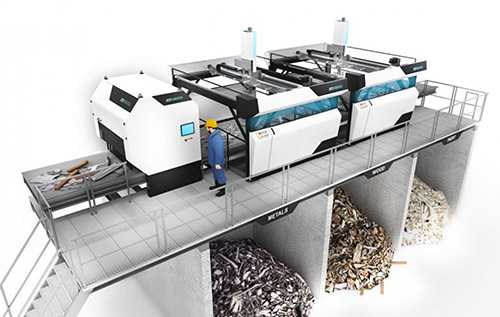These guidelines are not the detailed descriptions of how to structure your business plan, but rather the hints in regards to your business plan which you should pay special attention to.

Five questions to answer before you get down to writing a scrap recycling business plan
The first thing you should think about is a business idea. It should be clearly stated and based on the thoroughly collected information. The field of scrap recycling is quite broad, consequently, you should figure out in which niche you would like to conduct your business activity. This makes the business plan realistic and up-to-date.
- Which scrap materials would you recycle? You should decide on the kind of recyclable materials you’d like to concentrate on. For instance, plastic, metal, textile and/or cardboard.
- In which way would you like to collect the scrap materials? A steady supply in large volumes and proximity of your sources should be the key criteria for the selection.
- Which market segment would you address the final product to? You should discover which market segment can be interested in the selected reusable scrap materials.
- What would be the source of funding of your scrap recycling company? Think of special grants and special loans that can be offered by banking or governmental programs oriented on the business development. These costs would involve your facility, equipment, electricity, as well as, storage, and handling of the scrap recycling materials. The detailed calculations need to be presented in your scrap recycling business plan.
- How can you make your business efficient and profitable? Recycling processes, such as sorting, baling, storing and delivering should be evaluated, in order to determine what knowledge and technical equipment are required to process the specified scrap materials.
Identify objectives and goals of your scrap recycling business plan

Any type of business organization should be able to measure and evaluate the performance of their recycling services. Basically, that’s what objectives and goals are for
By setting your scrap recycling business plan objectives you determine the purpose and the general meaning of your business. Thus, any kind of sustainability objectives should be based on your personal vision of the future business activity.
Before you actually start writing your scrap recycling business plan, it’s highly suggested to conduct a detailed research on the recycling industry. Let’s say, this can be identified as the beginning of an efficient target-setting, measurement and review. Unfortunately, the entrepreneurs are often led by high ambitions which lead them to unrealistic or too exaggerated objectives.
Your business goals identify the targets which you wish to be reached by your business activity at the final stage. The 360° analysis and research are considered as the benchmark for setting your CSR goals. The eagerness to reach the goals serves for companies as the best motivator on the way to the best practices.
In fact, your objectives and goals need to be ambitious, just try to keep the balance between desirable and achievable. In order to deliver the realistic objectives, they should correspond to SMART principles:
- Specific
- Measurable
- Achievable
- Realistic
- Time-related
By following SMART concept, you can set the adequate objectives and goals, and reach them within the identified framework and timeline.
Scrap recycling business plan - market analysis
These days, the scrap recycling sector has tuned into one of the most influential industries, not only due to its economic impact, but also its environmental contribution. Just imagine, almost one trillion tons of scrap waste is generated on a regular basis. To the common scrap metal products belongs everything, starting from aluminum cans to junk cars. Even though, the recycling sector is broad and well-developed, there are still many areas which remain unexploited.
Your business can be successful and profitable only if it corresponds to the current trends and needs dictated by the industry. Your expectations can hardly be met by launching a business project that has no demand on the market. In addition, think about the potential profits, as scrap products are only valuable being collected in the certain volumes. Also, check which scrap metals can be easier collected in the chosen region and which of them have the higher price rate.
The market analysis represented in your scrap recycling business plan should be conducted in order to determine the market trends and market targets, as well as the main competitors on the market.
Select sales and marketing strategy for your scrap recycling business plan
Your sales and marketing strategies are the so-called tactics developed in order to lead the scrap recycling business. They need to be relied on your goals and objectives and be aimed at the actual fulfillment of those goals and objectives.
Of course, there are some marketing experts who are specializing in sales and marketing strategies, but you can benefit much more if you develop those strategies on your own. Thus, you have more control over inner business operations and can proceed with amendments any time you need it.
The strategies should be crafted that way so we could take advantage of the available market and grow into a stable business structure on the market of scrap metal processing. Both marketing and sales strategies should reflect your vision on how to attract potential buyers or scrap metal sellers.
While developing the marketing strategy for your scrap recycling business plan, pay special attention to advertising. Advertise your services in business magazines, radio, TV stations, and newspapers. By all means, don’t forget about Internet resources – websites undercovering the topic of recycling, social networks, as well as the homepages of other recycling companies which can be interested in the manufacturing field.
Determine the potential risks in your scrap recycling business plan
Finally, your scrap recycling business plan won’t work unless you evaluate all the potential risks that can be met on the way to the plan implementation. This should be done to stay prepared for any difficulties with the minimum loss to the successful business launch. Thus, scrap metal recycling industry has more than enough risk exposures, as follows:
- Loss of service of key personnel;
- Constant legislative and regulatory changes, as the result of illegal actions caused by the high prices;
- Weather-related business issues;
- Pollution exposure liability and some others.
Also, you need to get familiar with the potential risks to make sure your conventional insurance policy can compensate all the inconveniences and disturbances. Probably, you will want to have some other, more inclusive and supplemental insurance package to secure your team and your business.
Basically, when you know the potentially weak sides of your business, you can make some adjustments to the selected strategies. This will serve as the final check of the reasonability of your business tactics.
